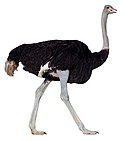Rheidae
Appearance
| Rheids | |
|---|---|

| |
| Greater rhea, Rhea americana | |
| Scientific classification | |
| Domain: | Eukaryota |
| Kingdom: | Animalia |
| Phylum: | Chordata |
| Class: | Aves |
| Infraclass: | Palaeognathae |
| Clade: | Notopalaeognathae |
| Order: | Rheiformes |
| Family: | Rheidae Bonaparte, 1853[1] |
| Type species | |
| Rhea americana | |
| Genus | |
| |
| Synonyms | |
| |
Rheidae /ˈriːɪdiː/ is a family of flightless ratite birds which first appeared in the Paleocene.[2] It is today represented by the sole living genus Rhea, but also contains several extinct genera.[3]
Taxonomy
[edit]Order Rheiformes (Forbes, 1884) Furbringer, 1888 [Rheimorphae Bonaparte, 1849; Rheae Forbes 1884][4][5][6][7][8]
- Family †Opisthodactylidae Ameghino 1895
- Genus ?†Diogenornis de Alvarenga 1983 (Late Paleocene) – possibly a member of Casuariiformes instead.[9]
- Genus †Opisthodactylus Ameghino 1895 (Miocene) – rheid?
- Family Rheidae (Bonaparte 1849) Bonaparte, 1853
- Genus †Heterorhea Rovereto 1914 (Pliocene)
- Genus †Hinasuri Tambussi 1995
- Genus Rhea Brisson 1760
References
[edit]- ^ Brands, Sheila (14 August 2008). "Systema Naturae 2000 / Classification, Family Rheidae". Project: The Taxonomicon. Retrieved 4 February 2009.
- ^ Agnolin, Federico L. (July 2016) [2017]. "Unexpected diversity of ratites (Aves, Palaeognathae) in the early Cenozoic of South America: Palaeobiogeographical implications". Alcheringa: An Australasian Journal of Palaeontology. 41 (1): 101–111. doi:10.1080/03115518.2016.1184898. ISSN 0311-5518. S2CID 132516050.
- ^ Mayr, G. (2009). Paleogene fossil birds. Springer.
- ^ Haaramo, Mikko (2007). "Paleognathia - paleognathous modern birds". Mikko's Phylogeny Archive. Retrieved 30 December 2015.
- ^ "Taxonomic lists - Aves". Paleofile.com (net, info). Retrieved 30 December 2015.
- ^ "Part 7 - Vertebrates". Collection of genus-group names in a systematic arrangement. Retrieved 30 June 2016.
- ^ Çınar, Ümüt (November 2015). "01 → Pᴀʟᴇᴏɢɴᴀᴛʜᴀᴇ : Sᴛʀᴜᴛʜɪᴏɴɪfᴏʀᴍᴇs, Rʜᴇɪfᴏʀᴍᴇs, Cᴀsᴜᴀʀɪɪfᴏʀᴍᴇs, Aᴘᴛᴇʀʏɢɪfᴏʀᴍᴇs, Aᴇᴘʏᴏʀɴɪᴛʜɪfᴏʀᴍᴇs, Dɪɴᴏʀɴɪᴛʜɪfᴏʀᴍᴇs, Lɪᴛʜᴏʀɴɪᴛʜɪfᴏʀᴍᴇs, Tɪɴᴀᴍɪfᴏʀᴍᴇs & Rᴇfᴇʀᴇɴᴄᴇs". English Names of Birds. Retrieved 30 December 2015.
- ^ Brodkob, Pierce (1963). "1- Archaeopterygiformes through Ardeiformes". Biological sciences. Catalogue of fossil birds. 7 (4). Bulletin of the Florida State Museum: 180–293. Retrieved 30 December 2015.
- ^ Alvarenga, H. (2010). Diogenornis fragilis (Alvarenga, 1985) restudied: a South American ratite closely related to Casuariidae (Thesis).[full citation needed]



